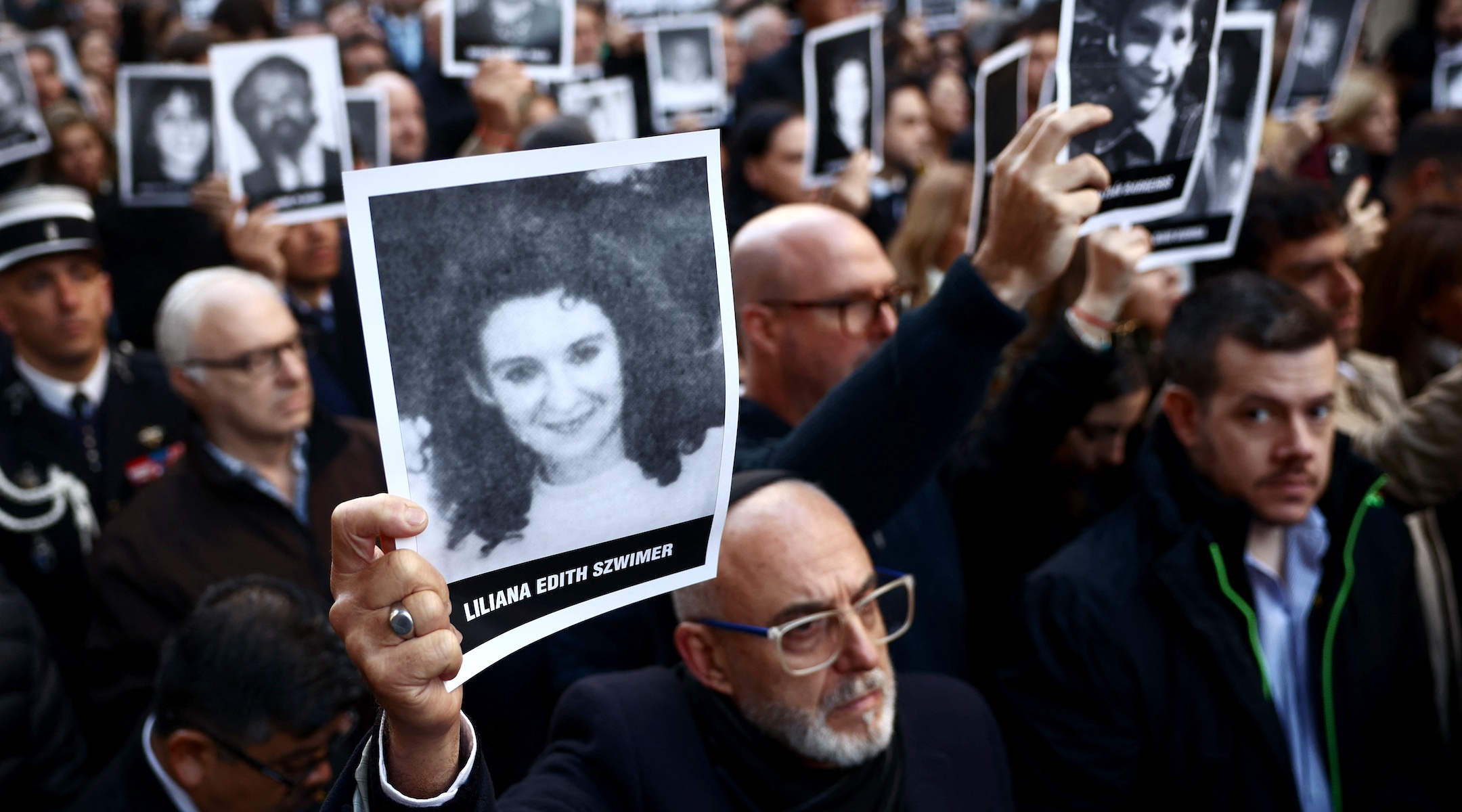BUENOS AIRES — Noah and Shai Abruj never met their uncle, Cristian Adrian Degitar, yet they still made the point of showing up on a cold winter night this week to honor his memory.
Degitar was 21, the age Noah Abruj is now, when he died on July 18, 1994, when a truck bomb ripped through the AMIA Jewish community center in this city, killing 85 people, including children, and widening the hole that had opened in the heart of Argentina’s Jewish community two years earlier when the Israeli embassy was bombed.
The Abruj brothers appeared at an event Wednesday on the eve of the bombing’s 30th anniversary focused on the victims and preserving their memory — and that of an event that has defined Argentina’s Jewish history and, to a significant degree, its politics. Different Argentine governments and judiciaries mismanaged or politicized the investigation, and as Jews and others have long complained, never truly followed up to bring those responsible to justice — even after an Argentine court ruled in April that Iran and Hezbollah were behind the attack.
“I didn’t get to know my uncle physically … but my relatives always tell me things about him, about what he did like and what he did not, his passions and his hobbies. They show me lots of photos and tell me lots of anecdotes,” said Shai, 18. “I don’t know if there will be justice in this case. I hope so. But … with or without justice I think it is extremely important to keep doing these types of events to remember, to teach and not to lose the memory of the ones who lost their lives during this attack. Future generations have to know what happened here.”
The event on Wednesday night was part of a slew of events held this week to mark the grim anniversary.
Yesterday in Buenos Aires, on the eve of the anniversary, U.S. antisemitism envoy Deborah Lipstadt joined more than 30 counterparts from around the world in launching the “Global Guidelines for Countering Antisemitism” — a plan of action for governments and civil society organizations. U.S. Senate Foreign Relations Chair Ben Cardin (D-Md.) led a Senate delegation to the commemoration today in Buenos Aires, where President Javier Milei promised to right decades of inaction and stonewalling in the investigations into the attack.
Earlier this month, Argentina designated Hamas a terrorist organization and ordered a freeze on its financial assets. Milei, in a departure from his immediate predecessors, has cultivated strong ties with Israel.
The official ceremony began at 9:53 a.m. local time, exactly the time when the car bomb exploded 30 years ago. President Joseph Biden sent a letter about the anniversary, and Secretary of State Antony Blinken, in his own news release, said, “We are committed to holding the perpetrators of these vicious attacks to account.”
Yesterday also saw an international summit in Buenos Aires about terrorism, organized by World Jewish Congress and the Latin American Jewish Congress. The focus was Iran’s role in orchestrating the attack, and linked it to support for Hamas in the lead-up to the Oct. 7 attack in Israel.
Cardin, whose Jewish grandparents came to the U.S. in 1908 from Lithuania, addressed the summit.
“Like my family, Jews in Argentina had to overcome systemic antisemitism,” said Cardin. “After the bombings here, this community refuses to compromise its values, despite decades of delayed cover ups, this community never gave up on justice.”
This year’s commemorations follow several significant shifts that have changed their flavor, including Milei’s ascension. The Oct. 7 attacks, in which 1,200 Jews were killed by Hamas terrorists, also dethroned the AMIA bombing as the deadliest attack on Jews since the Holocaust.
Amos Linetzky, president of AMIA, drew parallels between the two attacks in his remarks at the official ceremony.
“We are speaking about Oct. 7 here because the origin is the same: Iran,” he said. “Always Iran is supporting the terrorism, the common factor between AMIA and Oct. 7 is the hate, the hate against Jews and also the hypocrite reaction of the world.”
The attack has had ripple effects across the Diaspora, too. In an essay in the Times of Israel, Rabbi Claudia Kreiman of Temple Beth Zion in Brookline, Massachusetts remembered her mother, Julia Susana Wolynski Kreiman, who was one of the 85 victims.
“Her death was a turning point for me. I left the country, moving to Israel and eventually the United States. I became a rabbi and educator, an activist and pursuer of peace, dialogue and social justice,” she wrote. “I had been heading in that direction, but the killing of my mom further shaped my values and my determination to live a meaningful and intentional life — a life dedicated to the belief that humans can do better, that violence and hatred are not the ways of the world.”
JTA has documented Jewish history in real-time for over a century. Keep our journalism strong by joining us in supporting independent, award-winning reporting.






